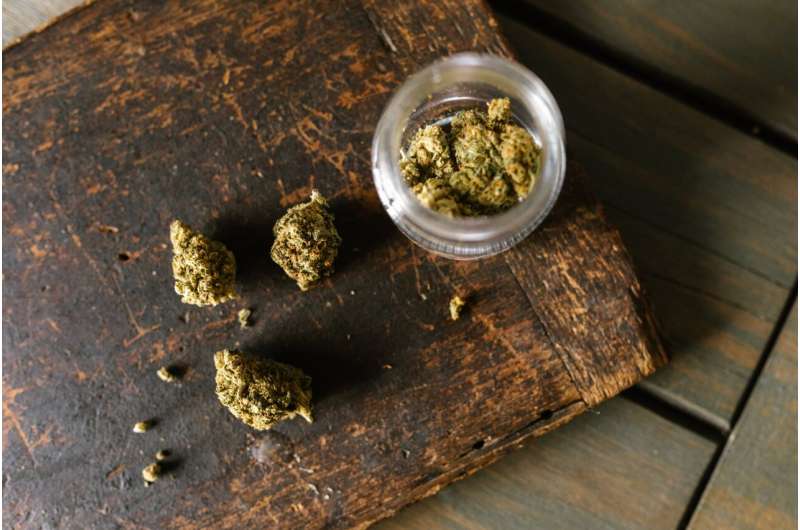This article has been reviewed according to Science X's editorial process and policies. Editors have highlighted the following attributes while ensuring the content's credibility:
fact-checked
peer-reviewed publication
trusted source
written by researcher(s)
proofread
College applications rose in states that legalized recreational marijuana

Colleges in states where recreational marijuana became legal over the past decade saw a significant but short-term boost in applications from top-notch students. They also got more applications overall. Those were the key findings of a new study our team published recently in the peer-reviewed journal Contemporary Economic Policy.
In the year that a particular state legalized recreational marijuana, the number of applications for that state's colleges grew by about 5.5% more than colleges in states that did not legalize it. This means that colleges in legal-marijuana states received a temporary boost in applications. We didn't detect any increase beyond the initial spike. Our results control for school quality, tuition prices, and labor market conditions that may affect student application decisions.
At a more detailed level, the gains were strongest for the largest schools, which observed a nearly 54% increase in applications compared with similarly sized schools in nonlegal states. Public colleges and universities benefited more than private ones, though applications for private schools rose in states where recreational marijuana became legal as well.
In addition, schools got more applications from high-achieving students. Standardized test scores for the top 25% of applicants spiked along with the quantity of applications.
Why it matters
As researchers continue to assess the risks and rewards of recreational marijuana, our results show that institutions of higher learning benefit when their home states allow their citizens to get high. One benefit is that schools had a larger and higher-achieving applicant pool to choose from. This in turn creates the potential to improve a school's academic profile.
Our results fit into a larger body of research analyzing what affects a student's application choices. We found that, similar to how schools see a spike in applications and SAT scores when those schools have winning sports teams, schools see spikes when they are located in states that legalize marijuana. While our data cannot prove it explicitly, this suggests that students do factor local policies into their college choice, a key result of interest for scholars and policymakers alike.
How we do our work
We use the Integrated Postsecondary Education Data System—a federal database commonly referred to as IPEDS—which provides information on a variety of college metrics. These metrics include the number of applications, demographic characteristics of students and detailed tuition prices, both before and after financial aid is applied.
Along with this data, we analyzed state legislation to see when recreational marijuana would be available to students in a particular academic year. So long as the recreational marijuana was legally available prior to the end of January—when many applications are due—we argue that marijuana could plausibly affect a prospective student's application decision for the following fall term.
What still isn't known
Our data cannot pinpoint why freshmen who are often coming straight out of high school—and thus not of legal age (21) to buy recreational marijuana—might base their application decisions on recreational marijuana's availability.
It could be the case that legal sales create a perception for prospective applicants that underage consumption is less risky. It could be simply because widespread news coverage made certain states seem more popular. Or it could be because more permissive public policies in one area, such as marijuana laws, might suggest more attractive and liberalized policies in other areas important to students, such as abortion. It's hard to say without talking directly to students themselves.
We also don't know how much of the application boosts that occur after legalization are being driven by out-of-state students. For example, did legalization in Colorado cause students from other states to apply to Colorado schools in higher numbers? Alternatively, in-state students may have elected to apply to even more Colorado schools than they would have in the absence of recreational marijuana as a way to stay in their home state.
The IPEDS database does not require schools to distinguish between in-state and out-of-state applicants. However, the database does delineate enrollees as in-state or out-of-state. From this, we find that out-of-state enrollees increased nearly 25% for the largest schools in the year of marijuana legalization. However, applying and enrolling are two very different actions. Applying indicates interest, but enrolling is more of a commitment.
What's next
A broader look at how college application rates were affected by legalization could yield important insights for colleges in states that permit people to consume cannabis without fear of incarceration. Similarly, it would be insightful to examine how legalized marijuana affected student outcomes for all schools while accounting for the nationwide disruptions associated with COVID-19.
More information: Christopher D. Blake et al, Higher education: The impact of recreational marijuana on college applications, Contemporary Economic Policy (2023). DOI: 10.1111/coep.12633
Journal information: Contemporary Economic Policy
Provided by The Conversation
This article is republished from The Conversation under a Creative Commons license. Read the original article.![]()




















